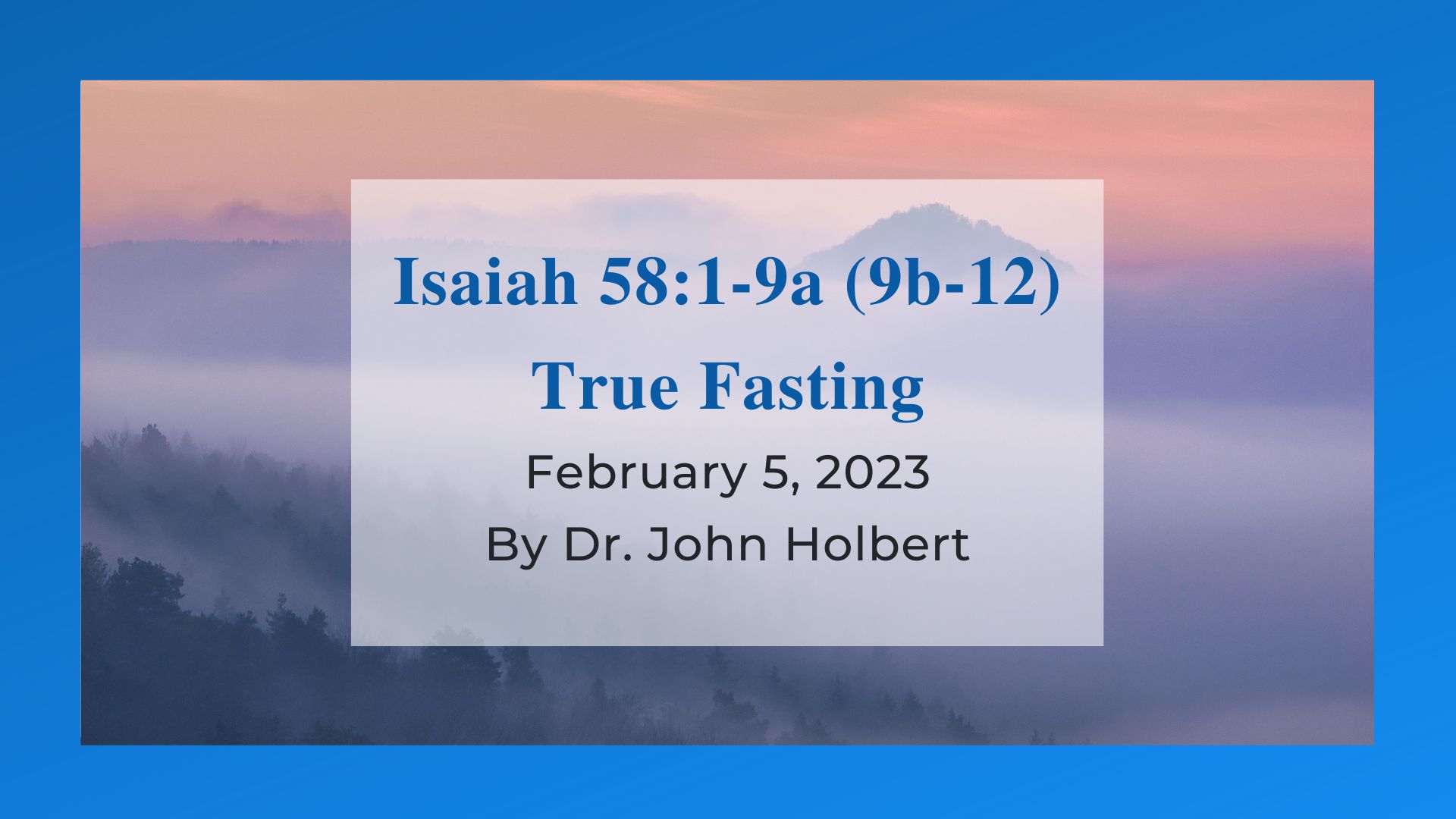True Fasting - Reflections on Isaiah 58:1-9a (9b-12)
by Dr. John Holbert on Monday, January 30, 2023

True Fasting
Isaiah 58:1-9a (9b-12)
The Peripatetic Hebrew Bible Preacher
It is from this marvelous and challenging passage from Isaiah that a significant religious and moral movement derives its name: “Repairers of the Breach” (Is.58:12). This movement began in 2015, spearheaded by the Rev. Dr. William Barber II, a pastor with a broad vision of God in calling people to do justice. It attempts, as I understand it, to live out the exact meaning of these ancient words from 3-Isaiah (this designation is simply to differentiate the material of Is.56-66 from the earlier sections of that biblical book, Is.1-39, called 1-Isaiah, and 40-55, called 2-Isaiah) in our own time. This is one prime example of a group of committed Christians, led by the ancient text, attempting to enflesh the word of God in very specific and powerful ways.
A closer look at the movement of Is.58 will indicate how Barber’s movement actually began. The chapter begins with a series of sarcastic comments concerning the role of fasting in the religious lives of supposedly faithful followers of YHWH in the historical period of the writing, perhaps the 5th-4th century BCE. Immediately in the text the prophet announces that what the worshipping people call fasting is in reality “rebellion” and “sins” (Is.58:1). And through this traditional understanding and practice of fasting, that is, the avoidance of food for a period of time, “day after day, they seek me, and are eager to know my ways, as if they were a nation that practiced righteousness,” while in reality they were “abandoning the justice of their God.”
And the sarcasm of the prophet increases as he mimics the whining voices of the fasting people: “Why do we fast, but you pay no attention, why humble ourselves, but you take no notice” (Is.58:3)? Can’t you see, YHWH, just how religious and pious we are, how we “bow down our heads like bulrushes, and lie in sackcloth and ashes” (Is.58:5)? Such behaviors are strictly designed to earn the favor of God, to hear God announce to us that we are undoubtedly the chosen ones because only God’s true people would act with such overt devotion, would subject their bodies to limited food and filthy clothing and ashes. Why don’t you take heed, God, and bestow appropriate divine goodies on us for our worshipping endeavors?
Unfortunately for them, and also for any in our own day who are equally confused about what true devotion to God is, Isaiah makes such true devotion plain. “Is not this the fast that I choose: to loosen the cords of injustice, to untie the thongs of the yoke, indeed to shatter every yoke? Is it not to share your bread with the hungry, bring the homeless poor into your house; when you see the naked to cover them” (Is.58:6-7)? Only then will “your light break forth like the dawn, your healing spring up quickly.” Only then, “shall you call, and YHWH will answer;” only then, “will you cry out for help, and hear God say, ‘Here I am’” (Is.58:9).
How often must the prophets of Israel, from Nathan’s rebuke of the evil David in the 10th century down to these words from the unnamed prophet of the book of Isaiah, say that God’s desire is ultimately not for external religious acts, for fine singing, eloquent praying, semi-painful fasting, etc, but for acts of justice and righteousness among all God’s people. Only with acts of justice may we become repairers of the breach, restorers of streets we may live in” (Is.58:12). Little wonder that Rev. Barber found here the inspiration for a grass-roots movement of religious people who desire a different world than the one they witness in the 21st century, a world riddled with breaches, broken places, a world where too many streets need restoration. Only concerted and persistent actions of justice can repair a broken world; only work led by God can restore dangerous and unliveable streets.
We modern Christians are too often precisely as those ancient Israelites, praying and fasting and worshipping, but not following such worship with genuine actions in the world, which Isaiah here calls “true fasting.” “Hunger meals” I have often arranged so that in the very tiniest of ways some may feel just a twinge of hunger, but too little have I followed such meals with actions of justice among those whose real hunger I, we, have long ignored. I am deeply grateful for the work of Rev. William Barber and his expanding ministry, attempting to repair broken places and people and restore wasted and forgotten streets in our cities. May his tribe increase, and may we find ourselves among them.
